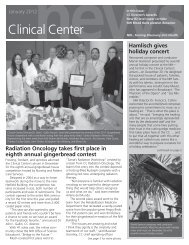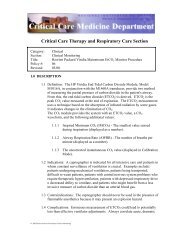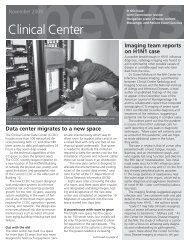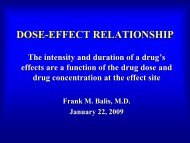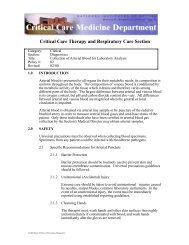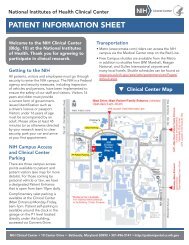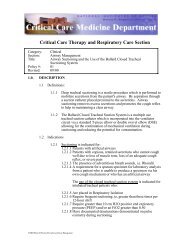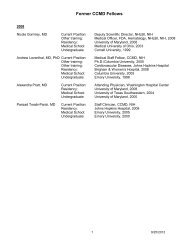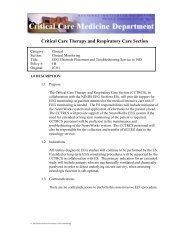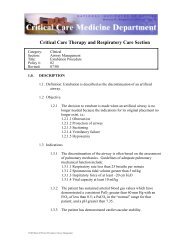2011 - NIH Clinical Center - National Institutes of Health
2011 - NIH Clinical Center - National Institutes of Health
2011 - NIH Clinical Center - National Institutes of Health
Create successful ePaper yourself
Turn your PDF publications into a flip-book with our unique Google optimized e-Paper software.
DC PARTNERSHIP FOR HIV/AIDS PROGRESS SEES ACCELERATEDACTION, OPENS FOURTH CLINICThe DC Partnership for HIV/AIDS Progress,announced in January 2010, has seen substantialacceleration in progress for the four original pillars<strong>of</strong> the program, said Dr. Henry Masur, chief <strong>of</strong> the<strong>Clinical</strong> <strong>Center</strong> Critical Care Medicine Department.In addition to directing the overall project in collaborationwith Dr. Carl Dieffenbach, director <strong>of</strong>the <strong>National</strong> Institute <strong>of</strong> Allergy and InfectiousDiseases (NIAID) Division <strong>of</strong> AIDS, Masur leadsone <strong>of</strong> the four pillars—enhanced care.Theothers—surveillance, prevention, and test andtreat—complete the base <strong>of</strong> the initiative.Theinitial investment in this long-term program, $26.4million over the first two years, supports clinicalresearch to help address the District’s HIV/AIDSepidemic, where roughly 3 percent <strong>of</strong> the populationis infected with HIV—among the highestHIV/AIDS rates in the nation.The project is acollaboration among several <strong>NIH</strong> institutes andcenters and the <strong>NIH</strong> Office <strong>of</strong> AIDS Research.One <strong>of</strong> the most exciting programs in the initiativeis the DC Cohort, which will link electronicrecords from the 12 largest HIV providers in DCto a database that can be used for research andfor quality improvement studies.These 12 clinicalpartner sites see 85 to 90 percent <strong>of</strong> the District’sHIV patients.The collected information will provideimportant data for epidemiologic and clinicalinvestigations.“We think we will have an unparalleledopportunity to look at an urban cohort,”said Masur.The four clinics where <strong>NIH</strong> specialists are embeddedto improve HIV subspecialty care for theunderinsured—directed by Dr. Dawn Fishbeinand within Masur’s pillar <strong>of</strong> enhanced care—haveseen approximately 200 patients with HIV andhepatitis C infections.Three initial clinics openedin June 2009 in connection with existing programsat Family & Medical Counseling Service, Inc., inSoutheast Washington; Unity <strong>Health</strong> Care’s WalkerJones <strong>Health</strong> <strong>Center</strong> in Northeast Washington; andWhitman-Walker Clinic in Northwest.The fourthclinic based at Unity’s D.C. General <strong>Health</strong> <strong>Center</strong>opened in the fall <strong>of</strong> 2010.In each clinic, <strong>NIH</strong> staff work directly with patientsto provide care and treatment.As the clinics expand,<strong>NIH</strong> is adding more experts. Dr.Anu Osinusi,an HIV-hepatitis co-infection specialist from theUniversity <strong>of</strong> Maryland School <strong>of</strong> Medicine inBaltimore, joined the <strong>Clinical</strong> <strong>Center</strong> to workwith patients at the new Unity <strong>Health</strong> Care’s D.C.General site and at the Unity’s Walker Jones facility.Additionally, Dr. Suad Kapetanovic, a psychiatristwith extensive HIV clinical and research experienceat the University <strong>of</strong> Southern California, hasbeen recruited by the <strong>National</strong> Institute <strong>of</strong> Mental<strong>Health</strong> to develop HIV-related mental healthresearch initiatives in connection with the DCPartnership.“This is a chance for <strong>NIH</strong> to do something goodfor the city and to expand our intramural researchagenda into more areas that will contribute toreducing the impact <strong>of</strong> HIV/AIDS in urbanAmerica,” said Masur.The clinics serve as study sites for a currently enrollingsafety and tolerability clinical research studyexamining an experimental, orally administereddrug in combination with injectable interferon andribavirin to treat hepatitis C in patients with HIV/AIDS.The oral drug has been proven safe and effectiveto treat parasitic infections, and is currentlybeing studied in research volunteers with hepatitisC mono-infection.The new study will involveas many as 35 research volunteers with HIV andhepatitis C who did not respond to prior standardtreatment regimens.New oral medicines potentially could replaceinjectable interferon-based regimens that areassociated with adverse effects. “The patients areexcited about the opportunities they will have tobe enrolled in clinical trials, especially for hepatitisC, which is so hard to treat,” added Osinusi.In addition to the new treatment study, the sitesare participating in a study that is retrospectivelyexamining progression <strong>of</strong> liver disease in African-American patients with HIV/AIDS and hepatitis Cto evaluate the theory that this population remainsin early stage liver disease longer than otherpopulations with the same co-infections.“We think wewill have anunparalleledopportunity tolook at anurban cohort.”ANNUAL REPORT <strong>2011</strong>• 27



